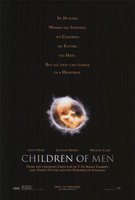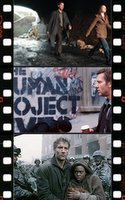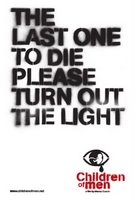
Ok, I know what you're thinking. Grimmauld12 has been missing for almost half a year, and in the meantime the only thing you have been doing is staring at Johnny Depp in the previous post. As always, there's a logical explanation for my absence, and as always it includes an adventurous trek into the Amazon with lots of twists, turns, and even includes a cameo role played by Tor Johnson. But enough of my amazingly cool adventures, that's a story best saved for later. For now let's turn to the first film post of the New Year.
It is the year 2027, and life absolutely sucks. War rages on throughout the entire planet (as usual), terrorism and depression is at an all time high, and radio stations are playing "oldies" from the year 2003 (a horror that none can compare too). The worst of it is that Baby Diego, the youngest person on the planet, has just passed away. He was 18 years, 4 months, 20 days, 16 hours, and 8 minutes old. Diego, to the world of twenty years from now, is considered to be celebrity status. For you see, the future holds a deadly disease: the inability for women to conceive children. As a result, chaos and terror reign within the citizens of the human race, and many, if not all, countries fall to the might of the people. Britain is the only country left with a considerable amount of decency, though even that is shred to pieces. Many immigrants flock to the now "greatest country in the world" only to find themselves rounded up and herded into cages and ghettos. These Fugees (shortened version of the word refugee, which is short enough if you ask me) are treated horribly, and the government doesn't care at all. A group of revolutionaries decide to rise up and stop this treatment, a group so powerful it makes you shiver with its mere name: Fish.
This is where Theo (Clive Owen) comes in (quite forcibly too). Theo is kidnapped off the streets of London by his ex-wife Julian (Julianne Moore). Instead of being taken to marriage therapy, Julian and her associates at Fish introduce Theo to Kee (Claire-Hope Ashitey), a very important girl. For one, Kee has a wonderful sense of humor. But more importantly, Kee is the first pregnant woman in almost 20 years. Julian explains to Theo that Kee is to be dropped off with the Human Project, where the greatest minds are working together in order to save us all. Unfortunately Kee is a Fugee and the government won't accept her, baby or no baby (so Fish says). Unfortunately (again) Fish has a small schism, and hopes to use Kee as a bargaining chip to improve on Fugee respect. Unfortunately (again, again) Julian is killed, and it's up to Theo, Kee, and the rest of Fish to save the future. Unfortunately (again, again, again) Theo finds out that the death of Julian was caused by Fish in order to secure Kee for themselves. Unfortunately (again, again, again, blah, blah, blah) this means that both the government and Fish are after Theo and Kee, causing much destruction, chaos, and death in the film.
The film is directed by Alfonso Cuarón, famous for some of his other mature and violent films such as Y Tu Mamá También (2001) and Harry Potter and the Prisoner of Azkaban (2004), and is based off the novel The Children of Men (note the addition of the word "The") by P.D. James. No, I did not read the book, nor did I travel into the future to check on the authenticity of the film, but nonetheless Cuarón displays a hauntingly real vision. For one, the technology is convincing(ish). There aren't any robots, hovercars, time machines, or retro 80 shops, but Theo's "old" car is as believable as the attitude and clothing of future UK (Theo wears a London 2012 Olympic sweatshirt). Sure the holographic computers are slightly far fetched, but anything is possible as long as it's believable.
Part of the reason the film was so believable is due to Cuarón's excellent filming skills. The majority of scenes in the film were filmed continuous with a hand held. This gives the effect that you are in the film, and that you are dodging explosions right next to Theo and Kee. This filming style enhances the film's cinematography dramatically, and further enhances the thrill of the film, along with the reality. What can be more thrilling than an apocalyptic future with you alongside the main characters?
 Not only does the reality of the film enhance the thrill, but the believability of the plot enhances it too. As stated before, this future world of London is as believable as your own backyard (if you own one, that is). The viewer can't be fooled with a magical fairy that comes and sets everything right. As the story moves on, Theo learns that the Human Project, commonly thought as an urban legend, might not even exist. The Human Project was contacted from one person, who contacted another, who contacted another, who contacted another . . . So by the end of the film, the quest seems almost pointless as our heroes await salvation in a tiny boat. Of course a project as important as the Human Project would not be public knowledge in a world torn apart by war, leaving Children of Men (2006) a very scary, but believable, future.
Not only does the reality of the film enhance the thrill, but the believability of the plot enhances it too. As stated before, this future world of London is as believable as your own backyard (if you own one, that is). The viewer can't be fooled with a magical fairy that comes and sets everything right. As the story moves on, Theo learns that the Human Project, commonly thought as an urban legend, might not even exist. The Human Project was contacted from one person, who contacted another, who contacted another, who contacted another . . . So by the end of the film, the quest seems almost pointless as our heroes await salvation in a tiny boat. Of course a project as important as the Human Project would not be public knowledge in a world torn apart by war, leaving Children of Men (2006) a very scary, but believable, future.In one of the most poignant scenes in the film, Theo is waiting for a contact to arrive in an abandoned school yard. Since there are no more children in the world, schools ultimately remain useless. While the camera is focused on Theo, a strange object lies within view. In the background lies a statue of a dinosaur, the once dominant creature of our planet that now remains extinct (well, except for on Isla Nublar). Alfonso Cuarón placed the scene here to remind the viewer that if the Theo doesn't succeed in reaching the Human Project, that humans will turn into dinosaurs. No, I don't mean we will literally turn into dinosaurs with big pointy teeth and brains the size of walnuts (a brain size that I'm sure many politicians already have), but humans will become extinct, just as the dinosaurs did.
Another important scene is just after the baby is born. Gun fights are brought into the Fugee camp that Theo and Kee are staying at, and Fish finds a way to sneak in and attempt to capture the baby. Of course, the baby cries due to all the noise, and silence falls upon everyone in the vicinity. The film's realism captures you so intensely, that the baby's screams remains as the most "beautiful thing" you ever heard.
Probably the best part of the film (in my opinion) was the character of Jasper (Michael Caine). Jasper is the only friend of Theo, and lives a secluded life deep in the woods (hidden so society won't find him). Living the life of a hippie, Jasper remains the opposite of Theo. That is, he is optimistic in attitude and hopeful for the future. If there was only one reason to see this film, Jasper would definitely be it.
The future is bleak. War, chaos, and no babies; it's no wonder Theo is always depressed. There is hope in Kee
 however, as she remains the only light in the dark. Through the director's ingenious filming skills, the film places you right in the chaos, giving you genuine feelings for the characters and events that take place. The cinematography and plot should be enough to persuade you to see the film, but if not that the character of Jasper alone is enough to make you cry (baby or not). The film's unique story wraps you into it that you will be hanging on to it 'till the very end.
however, as she remains the only light in the dark. Through the director's ingenious filming skills, the film places you right in the chaos, giving you genuine feelings for the characters and events that take place. The cinematography and plot should be enough to persuade you to see the film, but if not that the character of Jasper alone is enough to make you cry (baby or not). The film's unique story wraps you into it that you will be hanging on to it 'till the very end.
No comments:
Post a Comment